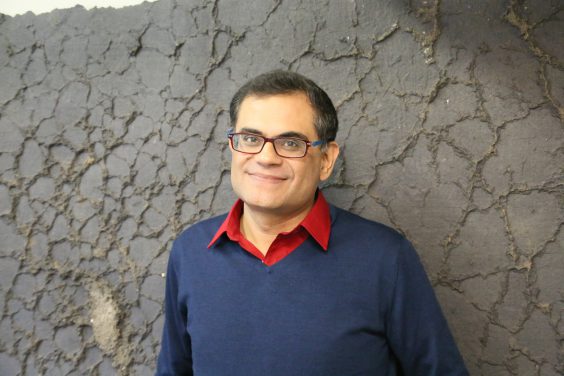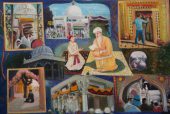Neither Here nor There: The Shifting Identities of Raza Rumi
by Hannah Waltz and Caitlyn Christensen / May 18, 2016 / No comments

Pakistani author and journalist Raza Rumi. Image by City of Asylum. Rights reserved.
A Pakistani journalist, writer, and public policy practitioner, Raza Rumi’s life exemplifies the intersection of the personal and the political. In 2014, his work in broadcast media brought him under surveillance of Islamists in Pakistan. He narrowly survived an assassination attempt by a militia linked to the Taliban, and fled to the United States. He is currently writing a memoir about his persecution and exile.
In this interview with SampsoniaWay.org, Raza Rumi talks about his many shifting identities and how the past informs and influences them: as a writer, as a Pakistani living in exile, and a traveler through the histories that have shaped him.
Raza Rumi is currently teaching at Ithaca College and is the ICORN writer-in-residence of City of Asylum in Ithaca, the United States.
“I Don’t Identify with Either”: Exile and Persecution
In 2014, your work calling for secular reform in Pakistan’s politics led to an attempt on your life by Islamic fundamentalists, an experience you describe in the essay “On the Run,” for Aeon Magazine. What was it like to write about an assassination attempt on your life?
To be honest, writing that piece was very difficult. It took me months to put it together. I had all the materials and ordinarily I’m a quick writer, but this piece was so emotionally jammed that it was difficult for me to actually recall all the events that took place before the assassination attempt and what happened thereafter. Writing it was a difficult professional act.
Ultimately, the process was cathartic. In fact, now I am working on a memoir expanding on this essay and its themes, going a little deeper and broader into the context of Pakistan. Working on that is a kind of reconnection with myself, part of a catharsis as an act of storytelling.
I’ve always been wary of the genre of writing in exile, considering it kind of stylized and hyped. Now that I am experiencing exile, I relate to writing by people like Edward Said and others who have written about the idea of belonging. My engagement with Pakistan, through the media and other public forums, made me realize how difficult it is to exercise free expression and be both a writer and a broadcaster. It also makes me question about my belonging in Pakistan. I also feel that perhaps I am a “foreigner” in the United States. My memoir is about locating oneself, and uncertainty about what it means to belong to a place, and what is home.
- From Delhi By Heart

- In 1555, Humayun regained control of Delhi and he returned to his Din Panah. In a year’s time, he tumbled down the stairs of Sher Mandal with books in his hand, thereby ending his tumbling life.
Continue reading
How has exile changed your sense of home?
Exile totally altered the idea of home. I have lived abroad before and worked in different countries. There was always a notion of home being Pakistan and in particular the city where I come from. Not anymore. My sense of home is vague and in emotional flux. I am here but am I really? Do I really belong here? And is this my home? I don’t know the answers.
In these few months I do feel as though I’ve left Pakistan and left it forever. It’s definitely not easy to turn your back, even if you want to, because one’s identity and whole notion of belonging to a particular time and place and nationality is so embedded. Writing about Pakistan is driven, in part, by the fact that because I am affiliated with a paper there, I have to stay in touch and write and engage, and see that it has improved so that perhaps one day I can return. There are all of these conflicts, but I cannot turn my back to Pakistan.
At the same time, after all these years, I have come to the conclusion that due to technological advancements and the mingling of cultural groups and ideas, identity is no longer static. A person can actually belong to many places.
How has exile changed your publishing process?
When I was writing Delhi By Heart, my editor was the person who was most encouraging. When I sent her a chapter she said, “Wow this really works, and you need to do it.” It was a really important relationship. I should also add that a few friends in Delhi also shaped my writing and immensely helped in the process. If they had not really pushed me enough I might not have finished the book. I also managed to get a very good editor who looked at the early chapters and helped me go through the process of writing. That was a different sort of relationship because that was more of a reality check engagement, where she would tell me regularly, “This particular part does not really work, it sounds untrue, it needs to go away.” So that relationship was critical.
Now that I am exile, I need to rediscover a new set of relationships for my memoir. This is more to do with finding a reshaped connection with myself. I need to go and hunt for a literary agent. I did get some potential agents a year ago and realized that the market here is totally different. In North America, as a Pakistani writing by and large about Pakistan, not everyone is going to want to read about it. There is a niche, and it’s more competitive and it’s more globalized. The power of writing would kind of determine the book’s success. The voice will have to attract both readers and publishers.
A person can actually belong to many places.
How has being a member of an exiled community of Pakistanis influence your continued connection to Pakistan?
After arriving in the United States I was gradually introduced to many people from the exiled Pakistani community. Many of them have been journalists, writers, poets, and academics who had to leave due to state repression or other threats that they faced. Our community exists in a liminal space: we live here and we work here and carry on our lives, but are still engaged with home. But is home willing to listen to us and our voice? And does it really matter?
I get feedback on articles I write saying, “Oh, you are there in the US so what would you know? Or, why would you be concerned?” There are people in Pakistan who see the idea of leaving as a betrayal in the patriotic framework. This feeds into the “traitor” campaign that was launched against me while I was working in Pakistan. Such characters think that whatever your country is about or however bad circumstances are, you should not shun your country because the act of leaving is a political act as well.
In March 2015, the anniversary of the attack, I wrote an op-ed for my newspaper in Pakistan. Afterwards there were so many negative comments on the newspaper’s Facebook page, saying, “Why is he complaining? He has run away!” I wonder what they would do in my place: just stay there and be in more trouble, danger, or dead? The insensitivity on the part of some people – usually as a result of national identity, but sometimes because my views as a liberal, secular humanist are not the mainstream – has shocked me and has changed my whole view of the world.
How has being “othered” by members of the Muslim community changed your relationship to Islam?
I was a fierce critic of Islamic extremism through my essays, which resulted in all of these threats. After coming to the United States, I have seen Islamaphobia in the streets of the West. That has rattled me. I am irked by the generalizations that are made about Muslims or Islam itself, such as Islam is inherently violent, or the disturbing rhetoric from American politicians about sending people back or not letting them into the country. I was on one side, and now I am in the mirror image of what I was going through in Pakistan. I find myself kind of lost and befuddled between these two strands of thought: Islamism and Islamaphobia. I do not really identify with either.
Continue reading this article on page 2




